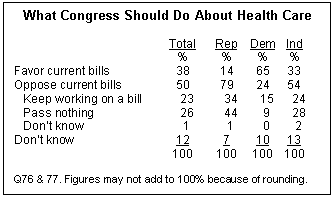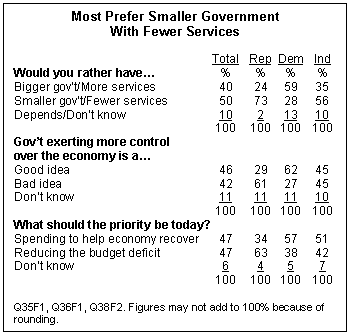Summary of Findings
Nine months ahead of the midterm elections, voters have conflicted attitudes about both political parties. Opinions of the Republican Party have improved significantly, and for the first time in years the GOP’s favorable ratings nearly equal the Democratic Party’s. Voting intentions for the fall elections also remain closely divided. However, the Democratic Party is still better regarded in many respects than is the GOP and far more people continue to blame the Republicans than the Democrats for the current state of the economy. And despite frustrations with his stewardship of the economy, bottom-line opinions of Barack Obama have not changed in the past few months.

The wild card in voter opinion at this point is the level of anti-incumbent sentiment, which is as extensive as it has been in 16 years of Pew Research Center surveys. About three-in-ten voters (31%) say they do not want to see their own representative reelected, which is well above the average percentage expressing this view in 29 previous surveys (23%). The only recent midterm campaigns when anti-incumbent sentiment equaled its current levels were in 2006 and 1994 – which culminated in elections that changed the balance of power on Capitol Hill.
The climate of opinion today, however, is different than it was prior to those historic campaigns in two important ways. First, through most of the 2006 campaign the opposition party was viewed more favorably than the incumbent party. In 1994, both parties were favorably rated by substantial majorities of the public; currently, neither is.
Second, opinions about Barack Obama are not nearly as negative as were views of George Bush in 2006 and are somewhat better than opinions of Bill Clinton were for much of 1994. Currently, slightly more voters say they think of their vote as a vote for Obama (24%) than as a vote against him (20%). Throughout most of 2006, roughly twice as many said they were voting “against” Bush as “for” him. And in three surveys during the fall of 1994, slightly higher percentages said they thought of their vote as against Clinton rather than for him.

The latest nationwide survey by the Pew Research Center for the People & the Press, conducted Feb. 3-9 among 1,383 adults reached on cell phones and landlines, finds continuing public dissatisfaction with the economy and disapproval of major policies to address it. Yet President Obama’s overall job approval ratings have remained steady in recent months. Currently, 49% approve and 39% disapprove of the way Obama is handling his job as president, which is largely unchanged from surveys since October.
However, there is growing impatience with Obama’s handling of the economy, which most Americans continue to regard as the most important problem facing the nation. Currently, as many say Obama’s economic policies have made economic conditions worse (27%) as say those policies have made things better (24%). In most surveys last year, modestly higher percentages thought Obama’s policies had made conditions better rather than worse. Notably, a substantial proportion of Americans (45%) continue to say Obama’s policies have not had an effect so far or that it is too soon to tell – and that figure has not come down since October.
In the new survey, just 38% of Americans say they approve of Obama’s $800 billion economic stimulus plan that Congress approved a year ago; 49% disapprove of the plan. In October, opinion about the stimulus was evenly divided and last June a clear majority (55%) approved of the plan.
Half of the public (50%) says Obama could be doing more to improve the economy, up from just 30% last March. Yet even more people expressed this view about George W. Bush throughout most of his first term. And in 1992, fully 76% said that Bush’s father, George H.W. Bush, could be doing more to improve economic conditions.

While Americans have grown more critical of Obama with regard to the economy, more still blame the Republican Party (39%) than the Democratic Party (27%) for current economic conditions.
Nonetheless, the Democratic advantage for dealing with the economy has all but disappeared. About four-in-ten (41%) say the Democratic Party could do a better job in dealing with the economy, while about as many (38%) say the GOP could do better. In August, Democrats held a 10-point lead as the party better able to deal with the economy (42% to 32%).
The same pattern is evident on several other issues – the Democrats have lost ground to the Republicans. Nonetheless, Democrats continue to lead by wide margins on education (by 19 points), health care (13 points) and energy problems (12 points). The Republican Party holds a modest advantage on reducing the budget deficit (six points) as well as a substantial – and growing – advantage in dealing with the terrorist threat at home (17 points). Just six months ago, the Republican Party’s lead in dealing with terrorism was six points.
Similarly, the Democrats’ advantage on several specific image traits has narrowed since 2009. But the Democrats continue to get better ratings than the Republicans on a number of key dimensions, including concern for the average person, the ability to bring about change, selecting better candidates for office and being less influenced by lobbyists and special interests. However, the GOP has drawn even with the Democrats as the party seen as better able to manage the federal government.
Over the past year, most of the GOP’s image gains have come from Republicans themselves and independents. Democrats for the most part remain loyal to their party and continue to overwhelmingly approve of Obama’s performance in office. Moreover, a majority of Democrats give their party high marks for standing up for traditional Democratic positions. Fully 63% of Democrats say their party has done an excellent or good job in standing up for the party’s traditional positions, such as protecting the interests of minorities and helping the poor and needy. That represents little change from last April, at about the 100-day point in Obama’s presidency.
Few Want Congress to Give Up on Health Bills
Most Americans (52%) say the Democratic Party has done a poor job in offering solutions to the country’s problems; 40% say the Democrats have done a good job in proposing solutions. But the Republican Party gets even lower marks in this regard: 60% say the GOP has done a poor job offering solutions for national problems while only about half as many (29%) say the GOP has done well.

There are signs of public frustration as well with the lack of progress on health care legislation. More Americans continue to generally oppose (50%) than generally favor (38%) the health care bills being discussed in Congress. Yet only about a quarter of the public (26%) prefers that Congress pass nothing and leave the current system as it is. A majority (61%) either favors the current health care bills or would prefer that Congress keep working on a health care bill.
Opposition to increasing the size and influence of government and concern about the federal budget deficit have been key factors in opposition to the health care bills. Those concerns also are evident in other findings in the survey: As has been the case for the past year, more people say they would rather have a smaller government with fewer services (50%) than a bigger government with more services (40%).

Moreover, the public is now evenly divided over whether it is a good idea for the government to exert more control over the economy than it has in recent years. Fewer than half (46%) say this is a good idea, while 42% say it is not. Last March, by a wider margin (54% to 37%), Americans said it was a good idea for the government to exert more control over the economy. Opinion also is split over whether the higher priority for the government should be more spending to help the economy recover (47%) or reducing the budget deficit (47%).
While the public is wary of too much government, it makes an exception when it comes to stricter regulation of major financial companies. A clear majority (59%) says it is a good idea for the government to more strictly regulate the way major financial companies do business; just 33% say this is a bad idea. Support for tougher regulation of financial firms is as high as it was last April (60% good idea).
There are other indications of a public backlash against large financial institutions. Just 25% say they have a favorable opinion of major U.S. banks and financial institutions while 68% have an unfavorable view. Negative views of large financial institutions are evident across political lines: 72% of Democrats, 68% of independents and 67% of Republicans have an unfavorable impression of such institutions.

Notably, there is considerably more public anger about banks and financial institutions paying large bonuses to their executives than there is over the government bailout of banks, partisan gridlock in Washington, or the growing budget deficit.
Fully 62% say they are angry over the large bonuses, while 48% say they are angry over the government bailing out financial institutions that made poor financial decisions. By comparison, fewer than half say they are angry over gridlock between Republicans and Democrats in Washington (39%) and the growing budget deficit (37%).
Other important findings include:
- Most Americans (61%) continue to favor allowing gays and lesbians to serve openly in the military. Support for allowing gays to serve in the military has fluctuated very little since 2005.
- Favorable ratings of the Supreme Court slipped from 64% in April 2009 to 58% currently. The survey also finds broad opposition to the Court’s recent decision allowing corporations to spend on behalf of candidates in elections; 68% disapprove of the decision while just 17% approve.
- The Tea Party movement gets a mixed review from the general public. A third (33%) say they have a favorable opinion of the Tea Party movement while 25% have an unfavorable opinion; a relatively large minority (42%) have never heard of the group or offer no opinion.
- The public cites economic problems as the most important ones facing the nation – 31% name unemployment, and 24% the economy generally. Healthcare and the budget deficit are named next most often (13% and 11% respectively)